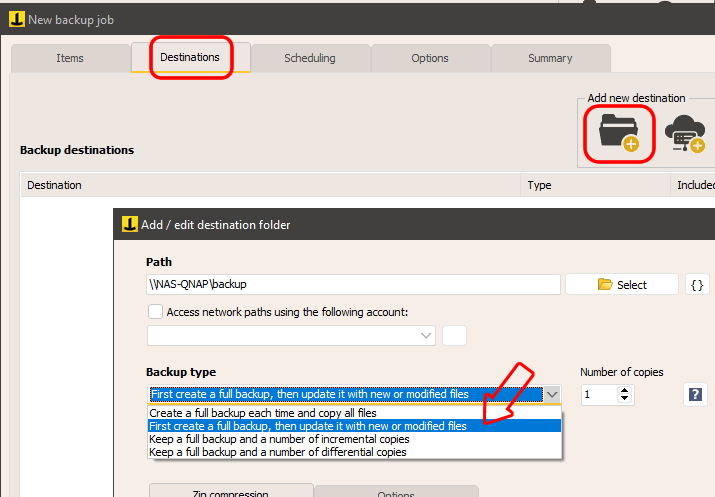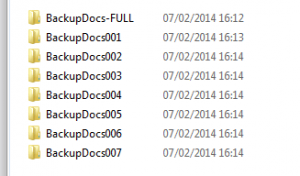← All Tutorials
The types of Iperius backup: full, incremental, differential
Iperius Backup is a versatile and complete backup software for Windows. It allows you to perform different types of backups: complete, incremental and differential.
Incremental backup helps improve performance and reduce data copying times. When you first launch the software, it creates a full copy of all files; subsequent copies will include only new or changed files .
With Iperius, you can develop backup strategies that consider daily changes to files, allowing you to have a history of all file versions . In the case of a Windows disk image backup, for example, a progressive update of the disk image is performed thanks to the “block level” or CBT mode, which detects only the data blocks modified since the previous backup.
For file-level backup operations (such as copying files to local disks, NAS, FTP servers, or cloud services like Google Drive or Amazon S3), there are several backup modes available. Here is an overview:
1. Initial full backup, followed by incremental updates (default):

By default, when you perform a backup to local, network, FTP or Cloud destinations, Iperius sets the incremental backup mode. At the first backup, all files are copied, and in subsequent backups, only new or modified files are copied (replacing existing ones). The final result is always an updated copy of the files, which reflects only the changes made. This mode is recommended as it improves performance, reduces disk wear and optimizes bandwidth in the case of network or remote backups.
Additionally, you can define how many copies to keep, thus obtaining multiple up-to-date full backups, with a rotation of backups starting from the oldest.
2. Completely new backup every time:

Full backup does not check the presence or creation date of the target files. In this mode, the software will always copy all files, overwriting existing ones. The time to complete the backup will remain the same, as all files will be copied and overwritten each time. Again, you can keep multiple copies, all complete. However, this mode is generally not recommended, as it consumes more time, disk resources, and bandwidth.
3. Full backup followed by incremental copies:

This mode allows you to adopt a detailed backup strategy, keeping a history of changes to specific files. With this configuration, Iperius will perform a first full backup of all files, and then generate numbered incremental backups, which will include only the changes since the last backup performed.
The destination folder structure will look like the one shown in the image below:

The folder with the “-FULL” suffix will contain the full copy, while the numbered folders will contain only the files that have changed or been added since the last backup. In a weekly schedule, the FULL backup might occur on the first day, followed by the others on subsequent days. If a file is changed every day, we will find a copy of it in each of the numbered folders. This type of backup optimizes disk space and keeps track of changes.
4. Full backup with differential copies:

Differential backup is similar to “full + incremental”, but each differential copy (in the numbered folders) will always include all new or changed files since the FULL backup (rather than since the last backup). This means that as you move away from the FULL backup, the size of a differential backup can grow.
The folder structure will look like the one shown below:

The folder with the “-FULL” suffix contains the full copy, while the numbered ones will contain the files that have changed or are new since the FULL backup. In the context of a weekly backup, the FULL could be performed on the first day, while subsequent backups will contain the files that have changed or been added since the last FULL.
Note: “Keep previous incremental and differential backups for” N days
Iperius also offers a feature that allows you to keep incremental and differential backups for a specific number of days, preventing them from being overwritten in the new cycle.

If you select to keep 7 copies, for example, each backup cycle will update the “BackupDocs-Full” and “BackupDocs-001” folders through “BackupDocs-007” with new and changed files. Additionally, the old folders will be moved to a directory called “BackupDocs-RECYCLEBIN”, renamed with the timestamp of the last backup cycle.
This operation will continue for seven days from the current backup cycle, and can be applied to both compressed and uncompressed backups.
This option is not available for backups to Cloud and FTP destinations.
Drive Image incrementale CBT
Incremental and differential modes are also available for Drive Image, based on a powerful CBT driver that allows the software to copy only the changed blocks. It then creates a full backup, a VHDX image file that contains the entire disk, and then, the following times, smaller files that contain only the changes.
Incremental Backup to FTP and Cloud
The above backup modes are available for local disks, network backups, NAS, and cloud services such as Google Drive, OneDrive, Dropbox, S3, Azure, FTP, or SFTP. Additionally, for each of these destinations, you can enable synchronization, which deletes files no longer present in the source, creating mirror copies, and freeing up disk space from obsolete or renamed files.
Zip Compression
All the types of backups described above can also be performed in compressed mode. Iperius allows you to create a complete backup in zip format, and then create incremental or differential backups also compressed in zip files.
Backup and Incremental Replication for VMware ESXi and Hyper-V
Iperius is a powerful software for incremental and differential backup of VMware ESXi (including ESXi Free) with CBT mode, and Hyper-V with RCT mode.
To replicate virtual machines from host to host on ESXi and ESXi Free, Iperius can use the forever-incremental mode, continuously updating the replicated virtual machine.
In ESXi incremental or differential backup, Iperius performs a first full backup, and then creates incremental or differential backups that contain only the changed blocks. This significantly reduces the time and space required. During recovery, Iperius allows you to select the full backup or any of the incremental or differential backups.
Also for Hyper-V, thanks to the RCT (Resilient Change Tracking) mode, Iperius can perform incremental and differential backups, copying only the modified blocks. Also for Hyper-V it is possible to perform granular and single file restores.
For any questions or doubts regarding this tutorial,
Contact us